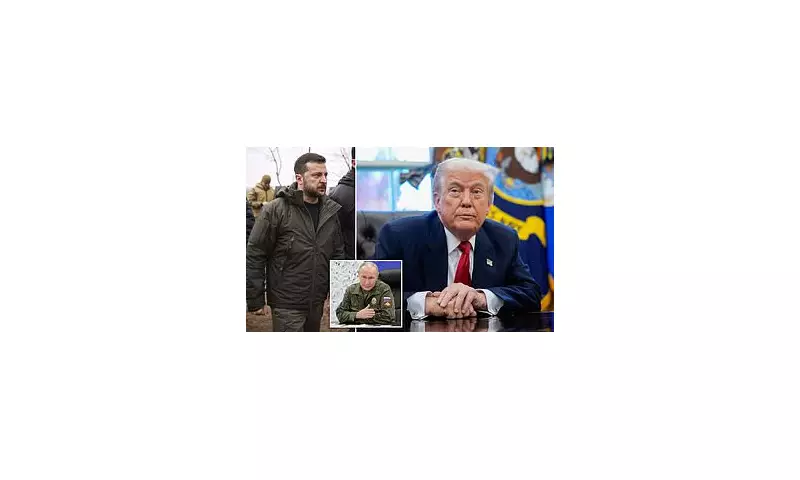
US President Donald Trump has sent his trusted special envoy to Moscow for emergency talks with Vladimir Putin, as concerns mount that his proposed peace plan for Ukraine is beginning to unravel.
A Revised Deal and Russian Resistance
On Tuesday, a US official confirmed that Ukraine had agreed to a new 19-point peace deal, though its terms are considered less favourable to Moscow than the original proposal. The revised agreement grants Washington and Kyiv the final decision on sensitive territorial disputes and includes American security guarantees for Ukraine.
This development prompted a sharp response from Russian Foreign Minister Sergei Lavrov, who warned that if the new plan erased key understandings reached between Putin and Trump at their August summit in Alaska, the situation would become fundamentally different.
President Trump took to Truth Social this afternoon, acknowledging the ongoing negotiations. He stated that the original 28-point peace plan, drafted by the United States, had been fine-tuned with input from both sides, leaving only a few remaining points of disagreement.
Trump announced he had dispatched Special Envoy Steve Witkoff, the architect of the Gaza peace deal, to meet with President Putin in Moscow. He added that he looks forward to meeting with both President Zelenskyy and President Putin, but only when the deal to end the war is final or in its final stages.
Key Changes and Military Implications
Hopes for an end to the bloody conflict, which has claimed approximately 300,000 lives since Russia's invasion in February 2022, were raised by reports that Ukrainian President Volodomyr Zelensky had accepted the terms of the new deal. However, sceptics warn that Putin is likely to refuse the new proposal.
The revised deal represents significant changes from the initial US draft. It no longer includes amnesty guarantees for atrocities committed during the war. While Kyiv has agreed to cap its army at 800,000 men, this represents an increase from the previously proposed 600,000 cap.
The original plan had permanently ruled out NATO membership for Ukraine, proposed handing the remainder of Donbas to Russia as a demilitarized zone, and mandated that Kyiv hold elections within 100 days. All these clauses have reportedly been amended or shelved for the time being.
President Zelensky confirmed ongoing talks with Washington in a post on X, expressing gratitude for America's efforts and personally for President Trump's involvement.
Diplomatic Manoeuvres and Mounting Pressure
The diplomatic push occurs alongside continued violence on the ground. Brutal overnight bombings in Kyiv saw Russian missiles strike residential buildings, killing at least six people, including an 86-year-old woman. Two power plants supplying hot water to homes were destroyed, plunging the city into power and water outages.
Ukraine responded with its own aerial attacks on Russia. Russian officials reported three people killed and at least 16 injured, with residential buildings damaged in the Black Sea port of Novorossiysk and the cities of Rostov-on-Don and Krasnodar. The Russian Defence Ministry claimed 249 Ukrainian drones were downed overnight.
Meanwhile, US Army Secretary Dan Driscoll met with the Russian delegation in the United Arab Emirates on Monday for secret talks, following weekend discussions with Ukrainian officials in Geneva. Trump, galvanised by his success in Gaza, had reportedly ratcheted pressure on Zelensky last week to end the war, even threatening to cut intelligence sharing and weapons supplies to compel Ukraine into the deal.
America's European allies were reportedly stunned by these tactics. The US had presented the peace plan to Kyiv at the end of last week and set a Thursday deadline for them to sign, according to sources.
White House press secretary Karoline Leavitt stated that the United States has made tremendous progress towards a peace deal by bringing both Ukraine and Russia to the table, acknowledging that a few delicate but not insurmountable details remain.
Lieutenant Colonel Jeffrey Tolbert, a US Army spokesman, confirmed that Secretary Driscoll and his team have been in discussions with the Russian delegation to achieve a lasting peace in Ukraine, noting that the talks are going well and they remain optimistic.
The ongoing negotiations face significant hurdles. Putin's foreign affairs aide, Yuri Ushakov, described British, EU, and Ukrainian-inspired changes to the original US draft as unconstructive. Furthermore, at the G20 summit in South Africa, leaders from Europe, Canada, and Japan signed a joint statement indicating that the peace deal required additional work, citing concerns over territory and limits on Ukraine's army.
The EU submitted a modified version of the US peace plan, drafted by the so-called European E3 powers - Britain, France, and Germany. This counter-proposal suggests that Ukraine's military be capped at 800,000 in peacetime rather than a blanket cap, and that negotiations on territorial swaps start from the Line of Contact, rather than pre-determining certain areas as de facto Russian.





